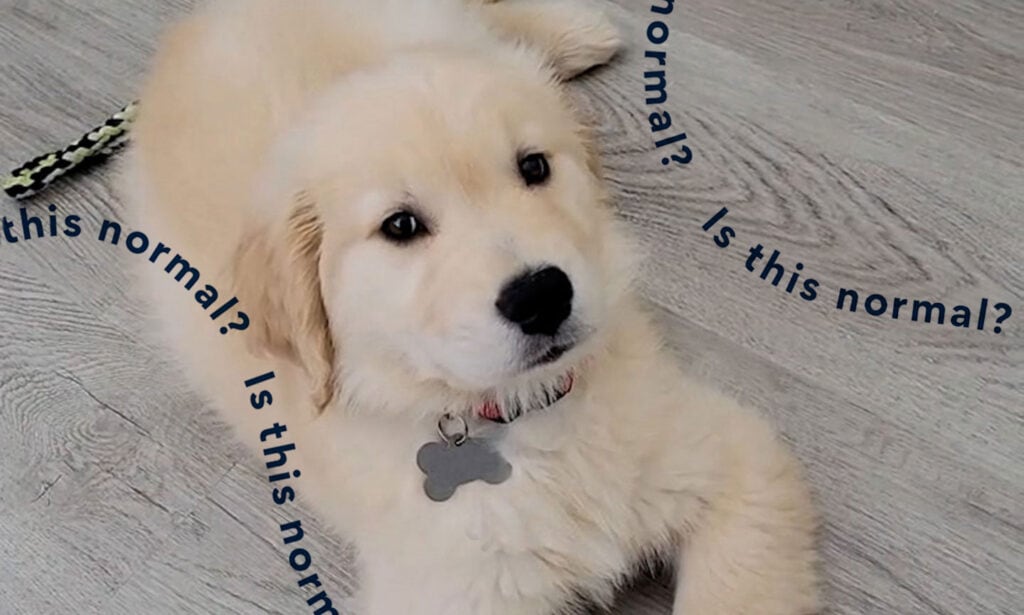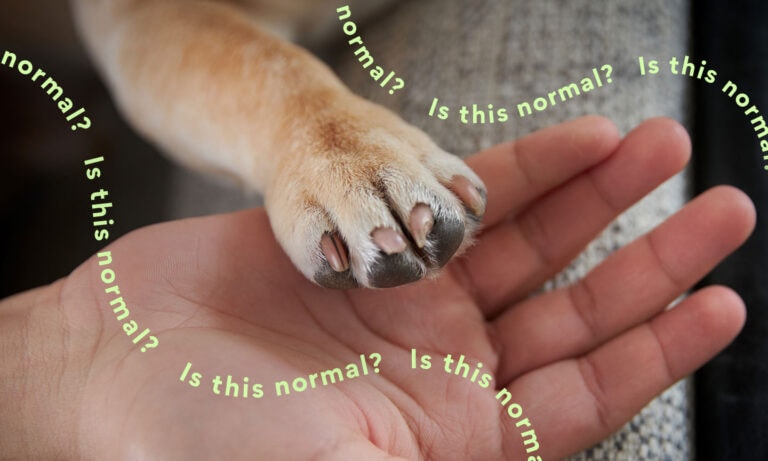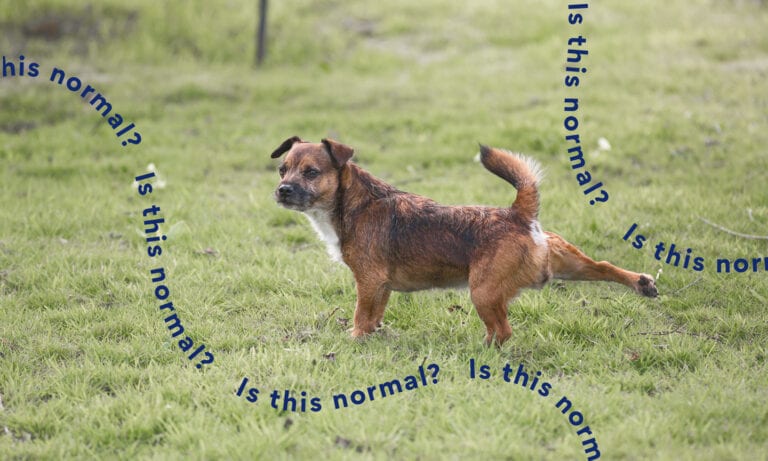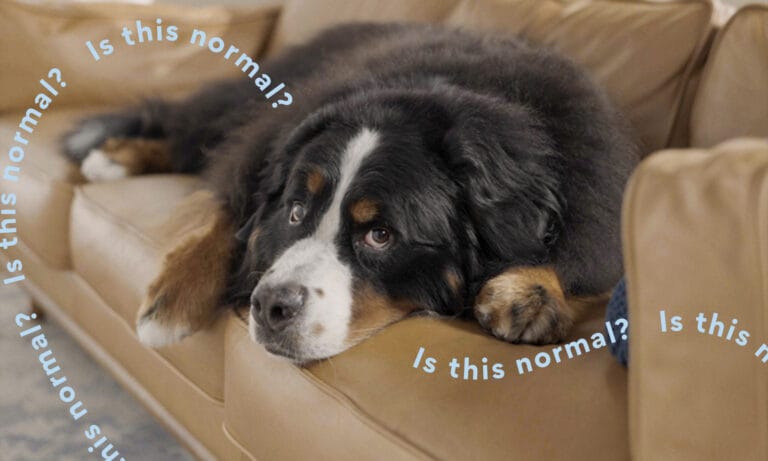Q:My dog sounded like he had the hiccups after he drank a bunch of water. Can dogs get hiccups like we do? Is this normal?
A: Yes, similar to humans, dogs can get hiccups, too. They are generally pretty harmless and there are various reasons as to why they might occur, like drinking or eating too fast.
“It’s as real and natural as us humans getting them,” says Dr. Cheri Honnas, DVM, an Austin, Texas-based veterinarian.
How To Recognize Dog Hiccups
Dogs hiccups sound and look a lot like human hiccups. Look for these telltale signs, according to Dr. Sarah Gorman, DVM, managing veterinarian at Small Door Veterinary in Boston, Massachusetts:
- Rhythmic contractions of the diaphragm (a chest muscle that helps us, and our dogs, inhale and exhale air) or spasms in the dog’s chest or abdominal area accompanied by a slight, repetitive “hic” sound.
- Lasting only a few seconds to a couple of hours typically
Why Do Dogs Get Hiccups?
Hearing a dog hiccuping is not something you may experience often, but rest assured, it is normal.
“Hiccups are caused by spasms in the diaphragm,” says Dr. Gorman. The following might result in dog hiccups:
- Eating or drinking too fast
- Getting overly excited or stressed out
- Minor gastrointestinal irritation or issues
- Drinking water too quickly
- Feeling chilly
In some rare cases, dog hiccups may be linked to more severe issues, like heat stroke, which is important to keep in mind, says Dr. Honnas. If they last for a long time (more than a few hours) or are accompanied by other signs of illness, such as drooling, vomiting or wheezing, contact your veterinarian.
Is It Hiccups or Something Else?
Sometimes, pet parents may mistake something else for hiccups and vice versa.
Hiccups vs. Respiratory Issues
It’s important to remember that hiccups are “generally restricted to the diaphragmatic region,” says Dr. Honnas, whereas respiratory issues may be more conspicuous. Signs that could indicate a respiratory complication include:
Your dog’s hiccup-like sound progresses to a wheezing sound
Any irregularity or difficulty in their breathing pattern
“In such cases, immediate veterinary attention is recommended to ensure the pet’s well-being,” cautions Dr. Honnas, who serves as the veterinary advisor to Bone Voyage Dog Rescue, a nonprofit that rescues dogs in Mexico and finds homes for them in the U.S. and Canada.
Hiccups vs. Reverse Sneezing
Sometimes, pet owners mistake reverse sneezing for hiccups. Reverse sneezing can kind of sound like a hiccup or cough. It is your dog’s soft palate’s reaction to irritants, while hiccups are all about the diaphragm spasms, Dr. Honnas explains. “It sounds scarier than it is, but trust me, it’s mostly benign,” she says.
Do Certain Dog Breeds Get Hiccups More Than Others?
Yes, specific dog breeds may get hiccups more often than others. “Particularly, brachycephalic breeds such as Pugs and Bulldogs are more susceptible,” Dr. Honnas shares.
She explains that the anatomy of these breeds—such as their shortened skull shapes—often leads to constricted airways. “This can increase the likelihood of hiccups,” she adds.
Do Puppies Get Hiccups?
Just like adult dogs, puppies can get a case of the hiccups, too. “And often do so more frequently than mature dogs,” adds Dr. Honnas.
She shares that, while the exact reasons aren’t backed by definitive scientific evidence, there are a few theories—one that has to do with fetal hiccups. “Some theories postulate that these hiccups in puppies might either be a carryover from their time in utero or a mechanism to aid in digestion and alleviate gas,” she shares.
Dr. Gorman goes on to explain that spasms within this muscle are normal and more common in puppies, therefore causing, you guessed it, puppy hiccups. “As the muscle strengthens with age, most dogs grow out of them,” she adds.
How Can You Get Rid of Dog Hiccups?
Thankfully, there are some simple expert-recommended ways to help get rid of dog hiccups:
- Adding a splash of maple syrup or honey to room-temperature water
- Waiting it out—most cases of hiccups in dogs go away on their own without intervention.
- Distracting your dog with a toy or non-vigorous play
- Giving your pup a gentle tummy rub
- Offering your furry friend a small amount of room temperature water in their water bowl as it can potentially soothe the throat and remove any irritation that might be causing the hiccups
- Taking your dog on a mellow walk
How Can You Prevent Dog Hiccups?
Eating and drinking too fast is a common way dogs get hiccups. You can do the following expert-recommended things during mealtime to help prevent your dog from getting them:
- Introduce puzzle feeders or slow feeder dog bowls into their feeding routine
- Offer smaller portions of dog food at a time
What if Dog Hiccups Don’t Go Away
In general, dog hiccups shouldn’t be a big deal and often resolve on their own. However, if any of the below occurs, Dr. Gorman recommends bringing your dog into the vet to get checked because they may be linked to an underlying medical issue.
- Hiccups persist for an extended period, such as longer than several hours
- Hiccups become more frequent or severe
- Your dog shows signs of distress or discomfort
“If hiccups aren’t packing their bags and leaving, it might be time to dial your vet,” Dr. Honnas adds. “It’s better to be safe than sorry.”
Dig into other weird dog behaviors:
Share:











